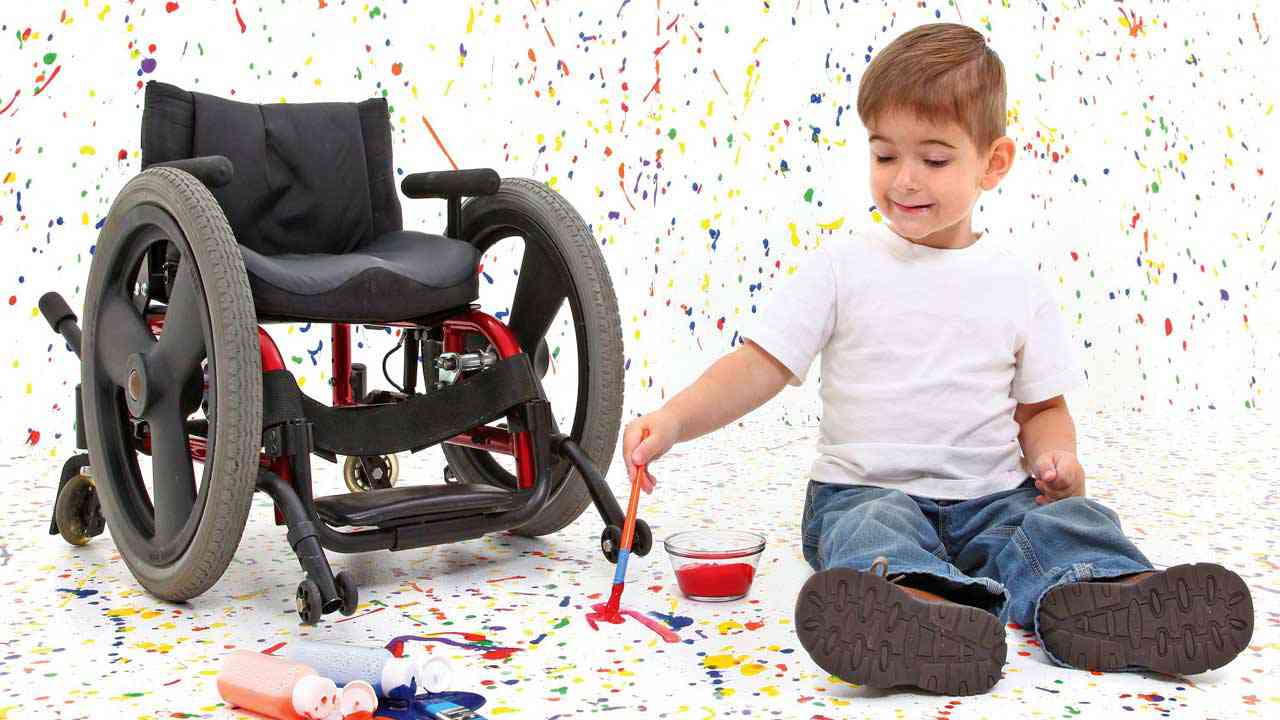
On the 3rd of December, we will be celebrating International Day of persons with disabilities. The theme for this year is “Achieving 17 Goals for the Future We Want”, which resonates with the recent adoption of the 17 Sustainable Development Goals (SDGs) of the United Nations and the role of these goals in building a more inclusive and equitable world for persons with disabilities. In Mauritius, lots of initiatives are being taken for the benefits of disabled children. Young professionals debate on how to improve their lives in Mauritius.
 Davina Gutty: “Our transport system is not adapted”
Davina Gutty: “Our transport system is not adapted”
Davina Gutty states that Mauritian children with special needs are mostly taken care of by NGOs and other such organisations. However, she adds, many of them still need more care. “There is no curriculum for these children. The books provided are not adapted for them. They do not benefit from proper follow up and they are not attended by paramedical teams.” Commenting on infrastructural issues, she says that our roads are not accessible for children with physical impairment. “Our transport system is not adapted to people with wheelchairs. Not all buildings are equipped with ramps or parking for people with special needs. Government needs to ensure and bear the responsibility fully.”
 Delphine Samanta Louise: “A lot is being done globally”
Delphine Samanta Louise: “A lot is being done globally”
People often perceive disabled children as individuals having very little chance to achieve and succeed in life, says Delphine. “Indeed, these children have certain shortcomings but in no way does it mean that they cannot overcome these difficulties and excel in life. It depends on how these children are empowered and encouraged to progress in society. It is our duty to make them understand that once we accept our limits, we can go beyond them. Nowadays, a lot is being done globally to help these children integrate in society and fulfill their dreams. It is usually done through laws and regulations, new services, commodities, new infrastructure designed to cater for people with special needs and more accessibility to education.”
She further adds “new technology such as prosthetics that has helped to breach the limitations of amputees. However, the important question is whether these new facilities and technologies are being made available to them in Mauritius. Actually, there are around 20 major organisations in Mauritius among which we have APEIM whose objective is making their lives better. Our disabled children have limited access to education. This is indeed a sad thing as some of them are as intelligent as any other child and have the willingness to study but have limited access to schools for children with special needs.
Some public schools sometimes even refuse to enroll children with mobility problems and treat them as social outcasts. Our current transportation system does not adequately accommodate children with special mobility needs. Unfortunately, parents need to pay out of their pockets for private transportation which discourages some of them to send their children to school. To get beyond these obstacles, it is imperative to set up a new scheme for these children. The government could provide more access via new infrastructure, which caters to the needs of disabled children by giving them access to mobility such as new buses or other form of transportation designed to resolve this issue.
 Kevin Keenoo: “We are doing things out of compliance”
Kevin Keenoo: “We are doing things out of compliance”
Kevin Keenoo argues that authorities and institutions are not engaged enough to foster a culture where these children are seen as “less abled” instead as being “disabled”. “Efforts are being done but I feel that we are doing things out of compliance rather than commitment. I am of the view that ‘handicapped’ children in Mauritius do not have much facilities compared to other children. Their rights aren’t entirely respected and valued. Over the past years, we have seen special needs school closing their doors, companies are still not creating jobs for people with disabilities, and we hear less about para-sport success.
With insignificant or no focus in these essential areas, we are stealing the dreams of children with ‘disabilities’. We are putting their future in jeopardy. I recommend an increased and dedicated fund to be voted in the government Budget for the construction of State-sponsored special needs schools around the island. While a stricter enforcement of The Training and Employment of Disabled Persons Act should begin through rigorous compliance audits, awareness sessions must unfold on the essence of hiring people with ‘disabilities’ otherwise the future of our children will be threatened. Children must be encouraged to participate in para-sport and, both the government and private bodies should actively engage in this cause. Last but not the least, counseling centers must open their doors. They must be dedicated to offer psychological counseling to families with children living with ‘disabilities’.”
 Washeefah Dinmahamed: “Government should introduce a subsidy system”
Washeefah Dinmahamed: “Government should introduce a subsidy system”
Handicap children must be treated equally as normal ones, states Washeefah. “As an integral part of building a moderately prosperous society, governments at all levels should safeguard and improve the living conditions of disabled people and ensure that they share the fruits of reform and development. Moreover, promoting the living conditions of disabled people needs increased national effort and support. In addition, to allow persons with disabilities aim and maintain maximum independence, capacity development efforts should be aimed at ensuring access to employment.
This can be done by promoting access to inclusive education, skill development and vocational and entrepreneurial training. Furthermore, the government should introduce a subsidy system; expand the pension scheme and medical insurance to disabled people. The latter should be given the feeling of well being in society. To conclude, we ourselves should change our mindset towards the handicap children and place trust in them for them to be at ease and feel a sense of belonging.”
 Mervyn Anthony: “We are decades behind”
Mervyn Anthony: “We are decades behind”
Mervyn explains that in Mauritius, children with disabilities are deprived of their fundamental rights to equal opportunities for access towards inclusive advancement and empowerment. “We cannot afford to expect for innovative changes to enhance the empowerment of children with disabilities because we are decades behind for the setting up of contemporary policies to support the empowerment of these children. According to development undertaken at international level, technology has emerged as an empowerment tool for the elimination of barriers for children with disabilities.
Instead of playing the role of a proactive partner in international development for the empowerment of children with disabilities, Mauritius is slowly reactive and reluctant in the promotion of such development which amounts to a misuse of public resources probably due to the lack of commitment with the absence of the right person in the right place. One of the various examples regarding this inefficient management of public resources is the absence of the implementation of a specific program for Cochlear Implant for profoundly deaf children in Mauritian hospitals.”
He believes that our children with disabilities are victims of the lack of efficiency of our decision makers that is holding back their development; the solutions for the improvement of the life of these children lies in the need for change concerning inefficient decision makers to support the empowerment of these children. “At this stage the key towards improvements is the implementation of the required awareness raising campaigns to disclose the inefficiency of our decision makers that is causing these children a lot of prejudices.”
 Deegesh Maywah: “There is still a long way to go”
Deegesh Maywah: “There is still a long way to go”
Deegesh reveals that Mauritius has witnessed a significance increase of ‘disability occurrence since three decades now. “Starting from roughly 10,000 (1990) cases to a staggering 60,000 ‘dis’ability incidence in 2015. While our society is still growing, our current model for disability is still looking for its bearings to allow our ‘dis-abled’ fellow citizens to enjoy a fully emancipated journey. The disabled community in Mauritius has witnessed several key “milestones” namely the adoption of the Training and Employment of Disabled persons Act 2000 and the ratification of the UNRCPD in 2013. However, there is still a long way to go in order to allow the ‘dis’abled persons in Mauritius have a fully inclusive access to our health system, social integration, and education system.”
For him, the Mauritian Government has attempted to revamp the system, the lack of an appropriate strategic plan taking a holistic approach towards the development may have not met the desired effects. “The Mauritian government has made several attempts in this context such as free transport for PwDs, and taxi expenses refund to university students, however the fact remains that these conventional transport is not fully accessible to our disabled students. As highlighted by the Economic and Social Council of the United Nations, Mauritius have a long way to go towards the fully integration of the disabled persons in the community.
While article of the same reference advocated that the ‘de facto’ discrimination faced by the disabled children coming from low social economic background, our non-adaptive system, direct the disabled child towards our special needs framework. One of the most important changes that need to be brought is the shift of paradigm towards the Social Model of Disability. Through this model, our current framework and research strongly highlights that it is the society that contributes to further disabling the disabled persons. While the famous motto of the relates “Nothing About Us, without us”, our integral development of Mauritius should be made disabled friendly and it is high time that our educational system adapt and build more adaptive and inclusive educational system.”
 J'aime
J'aime














